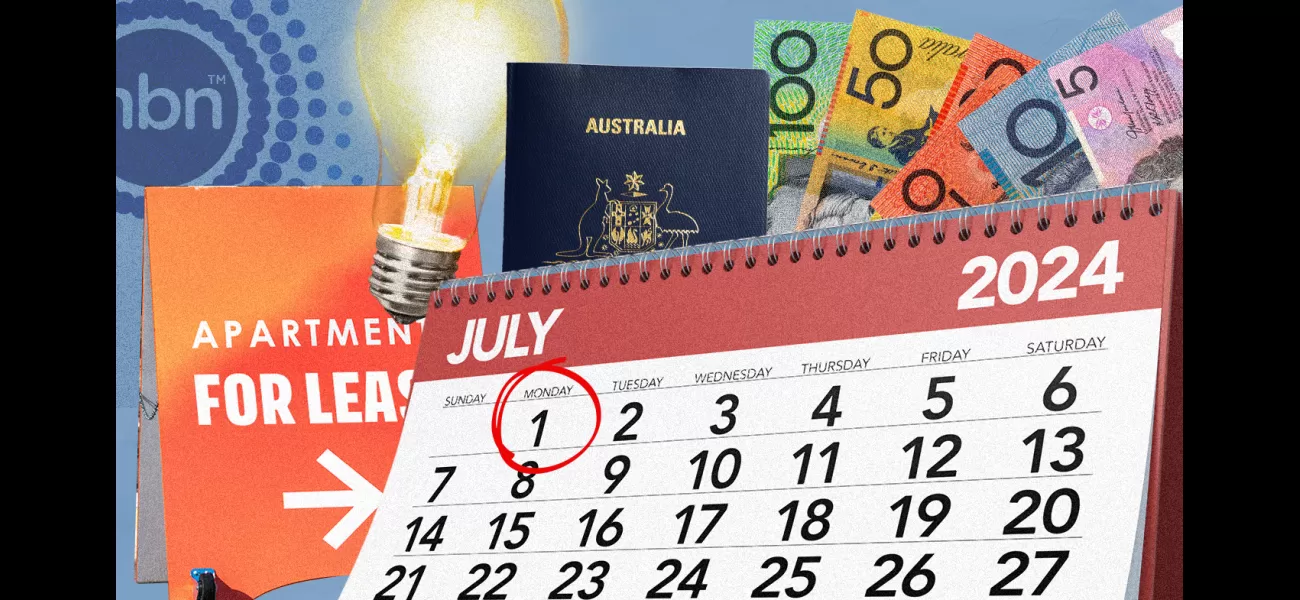Changes coming on July 1st.
On Monday, there will be changes that will affect you. This article explains what they are and how they will impact you.
June 25th 2024.

As the new financial year begins on July 1, it's not just tax time that you need to be aware of. There are a number of changes happening, from pricing and policies to payments, that will have a significant impact on your finances. Some of these changes occur annually, while others are one-off major shifts. Let's take a closer look at what's in store for you on Monday and how each of these measures will affect you.
First up, the long-awaited stage 3 tax cuts will finally come into effect after being in the works for the past six months. Unlike other forms of tax relief that come as lump-sum payments, these tax cuts will result in a higher take-home salary as less money will be deducted by the tax office. In other words, it's like getting a pay raise every payday.
Next, there's good news for minimum wage workers as the minimum wage will increase by 3.75% from $23.23 to $24.10 per hour. This means an extra $33 in the weekly paycheck for someone working 38 hours. Additionally, eligible parents will have access to an extra two weeks of paid parental leave, bringing the total to 22 weeks. This will increase even further in 2025 and 2026.
There's also a boost for superannuation, with the guarantee increasing from 11% to 11.5%. This means more money going into the super accounts of full-time, part-time, and casual workers. And for those struggling with energy bills, the government has announced a $300 relief for every household this financial year, in the form of four $75 rebates that will be automatically applied to your bills.
Speaking of energy bills, there's some good news for a large portion of the population as default market offers are coming into effect in New South Wales, Victoria, South Australia, and South-East Queensland. This will result in savings of up to $170 a year for households with average energy usage, even before the government rebates kick in. However, South-East Queensland ratepayers can expect a small increase in their energy bills, although it will still be lower compared to the previous year.
For those receiving Commonwealth Rent Assistance, there's a 10% increase in the payment which will help around 1 million households. This is the second consecutive year of increase, with last year's rise being 15%. And more than 2 million Australians will see a hike in their welfare payments as quarterly indexation takes effect.
On a less positive note, there will be an increase in internet prices due to wholesale NBN price hikes, with some households having to pay more for their existing plans. However, there are also some plans that will become cheaper. And if you're planning on traveling overseas, be prepared to pay more for a passport as the cost for a 10-year adult passport will increase from $346 to $398.
In an effort to protect workers from deadly illnesses such as silicosis and lung cancer, the sale, production, and installation of engineered stone will be banned from July 1. This ban will be implemented differently in different states and territories, with some having a transitional period. And finally, the federal government's housing targets will come into effect, with the aim of building 1.2 million new homes by June 2029. This will hopefully help to address the ongoing housing crisis in Australia.
First up, the long-awaited stage 3 tax cuts will finally come into effect after being in the works for the past six months. Unlike other forms of tax relief that come as lump-sum payments, these tax cuts will result in a higher take-home salary as less money will be deducted by the tax office. In other words, it's like getting a pay raise every payday.
Next, there's good news for minimum wage workers as the minimum wage will increase by 3.75% from $23.23 to $24.10 per hour. This means an extra $33 in the weekly paycheck for someone working 38 hours. Additionally, eligible parents will have access to an extra two weeks of paid parental leave, bringing the total to 22 weeks. This will increase even further in 2025 and 2026.
There's also a boost for superannuation, with the guarantee increasing from 11% to 11.5%. This means more money going into the super accounts of full-time, part-time, and casual workers. And for those struggling with energy bills, the government has announced a $300 relief for every household this financial year, in the form of four $75 rebates that will be automatically applied to your bills.
Speaking of energy bills, there's some good news for a large portion of the population as default market offers are coming into effect in New South Wales, Victoria, South Australia, and South-East Queensland. This will result in savings of up to $170 a year for households with average energy usage, even before the government rebates kick in. However, South-East Queensland ratepayers can expect a small increase in their energy bills, although it will still be lower compared to the previous year.
For those receiving Commonwealth Rent Assistance, there's a 10% increase in the payment which will help around 1 million households. This is the second consecutive year of increase, with last year's rise being 15%. And more than 2 million Australians will see a hike in their welfare payments as quarterly indexation takes effect.
On a less positive note, there will be an increase in internet prices due to wholesale NBN price hikes, with some households having to pay more for their existing plans. However, there are also some plans that will become cheaper. And if you're planning on traveling overseas, be prepared to pay more for a passport as the cost for a 10-year adult passport will increase from $346 to $398.
In an effort to protect workers from deadly illnesses such as silicosis and lung cancer, the sale, production, and installation of engineered stone will be banned from July 1. This ban will be implemented differently in different states and territories, with some having a transitional period. And finally, the federal government's housing targets will come into effect, with the aim of building 1.2 million new homes by June 2029. This will hopefully help to address the ongoing housing crisis in Australia.
[This article has been trending online recently and has been generated with AI. Your feed is customized.]
[Generative AI is experimental.]
0
0
Submit Comment





